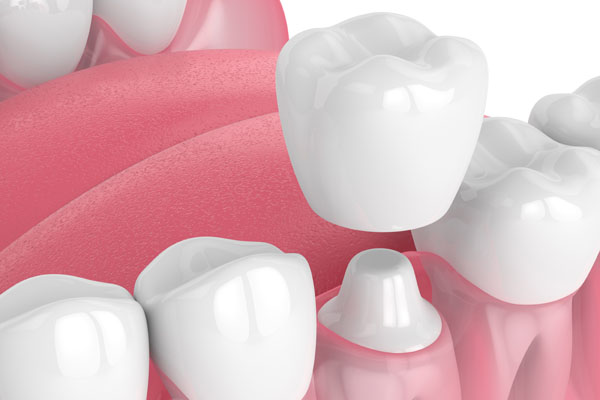When a Dental Crown Is Needed for a Cavity

A dental crown is a type of dental restoration that covers the entire tooth on all sides. It offers excellent protection for a damaged or weakened tooth, and it is a great treatment option for moderate to severe cavities. This review discusses the role of dental crown restorations for cavities and other oral health concerns.
When do dentists recommend a dental crown to treat a cavity?
Generally, dentists recommend a dental crown to treat a cavity when the cavity is relatively severe and cannot be adequately treated by a dental filling. Dental fillings are typically reserved for small cavities, whereas a crown is large enough and offers the necessary protection to address severe cavities. Additionally, a dental crown is usually necessary to treat a cavity if the tooth requires a root canal procedure. Specifically, this is necessary when the decay extends to the tooth’s root and causes decay to the dental pulp in the tooth’s root.
The benefits of a dental crown for cavity treatment
Dental crowns are an excellent treatment option for cavities as they provide long-term and reliable protection for the tooth. They also look just the same as natural teeth, so they offer cosmetic benefits. Additionally, they function just like natural teeth. They are also more appropriate for teeth further back in the mouth (molars, premolars), whereas alternative solutions such as veneers and dental bonding typically work better for front teeth (and specifically only the visible surface of front teeth).
Six additional signs that indicate a dental crown is necessary
There are many uses for dental crowns. Along with being used to restore teeth after cavities develop, dental crowns can also be used to restore a cracked or chipped tooth, a loose or weakened tooth, a worn-down tooth, a missing tooth, an uneven or short tooth, or a tooth that is severely stained.
The patient has a cracked or chipped tooth
A dental crown is incredibly useful for restoring a tooth that is cracked or chipped. Cracks and chips can occur for a multitude of reasons, from biting down on hard candies or ice to enduring a blow to the mouth during a sporting event. When these events occur, a crown is often recommended.
The patient has a weakened or loose tooth
Patients who have a weakened tooth can restore the strength and support of the tooth with a dental crown in many cases. This helps stabilize the tooth overall and often greatly reduces the risk of tooth loss.
The patient has worn-down teeth from bruxism
Bruxism, also called nighttime teeth grinding, can damage teeth and cause them to appear short and worn down. When this occurs, restorations are usually necessary. The most common type of restoration that is used to treat bruxism is a dental crown. This can restore the appearance, size, and function of teeth, especially molars and premolars.
The patient has one or more missing teeth
Dental crowns are also the primary restoration for most types of teeth replacement options. Dentures, dental implants, and fixed bridges all require the use of dental crowns. Subsequently, anytime the patient is missing one or more teeth and seeks a replacement solution, dental crowns are likely recommended. For implants, this involves attaching the crown(s) to the implant(s), whereas they are supported by adjacent teeth with a fixed bridge.
The patient has an uneven or short tooth
Dental crowns are very popular due to their ability to restore the patient’s oral health and functional capabilities. However, they also are often used to restore the patient’s smile as well. For example, a dentist may recommend a dental crown if the patient has a naturally uneven and short tooth that affects the symmetry of the patient’s smile. In this case, the crown can lengthen the tooth and provide a more aesthetically-pleasing smile for the patient.
The patient has a severely stained tooth (or multiple teeth)
There are several ways to treat stained teeth. However, when stains are severe to the point where in-office whitening procedures are not an option, dental crowns may be recommended. In these instances, the dental crown can help restore the tooth’s ideal shade and provide the patient with a brighter and more attractive smile.
Are you dealing with symptoms of a dental cavity?
Our dental practice offers dental crown treatment for cavities and other oral health concerns. To learn more and to find out all of your cavity treatment options, call us and schedule a consultation visit.
Request an appointment here: https://gkdentaloffice.com or call GK Dental PC at (617) 826-6075 for an appointment in our Everett office.
Check out what others are saying about our dental services on Yelp: Dental Crown in Everett, MA.
Recent Posts
When dentists recommend dental crowns, they are referring to caps that they place atop damaged teeth. Crowns restore the shape of a patient's tooth, covering the tooth and protecting it from further damage when fillings are insufficient. Dentists shape crowns from porcelain, resin, metal, or ceramic.Every day, dentists use dental crowns to restore smiles. When…
When a person is missing one or more teeth but does not need a full set of dentures, dental bridges may be recommended to take the place of the lost teeth. The number of teeth that a dental bridge replaces may depend on several factors.Dental bridges consist of two or more crowns that attach to…
For patients in need of dental crowns, there are plenty of options available. Two of the most common choices are porcelain crowns and metal crowns (often with a porcelain overlay fused to the metal). Depending on a patient's specific circumstances, one of these crown types may be the preferred option.Metal crowns have the advantage of…
A dental crown is an oral prosthetic used to protect a tooth or restore its appearance. Also called a cap, it fully encloses the part of the tooth visible above the gums. It protects the tooth from saliva, bacteria and debris in the mouth.Dental crowns are one of the most common oral prosthetics, and their…


